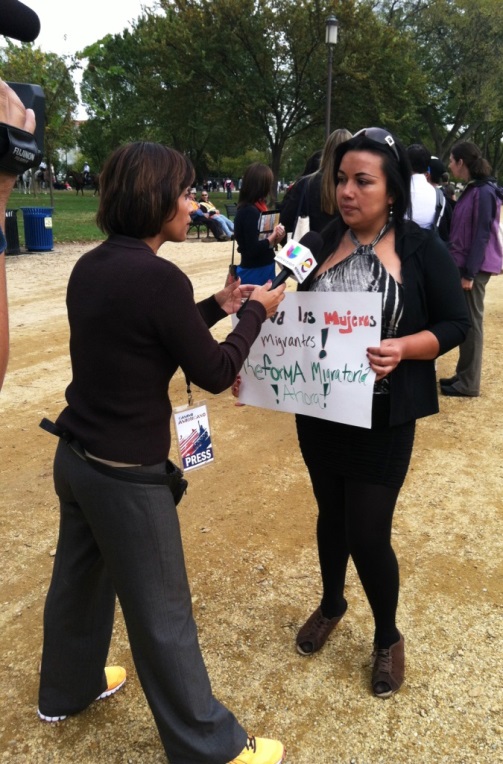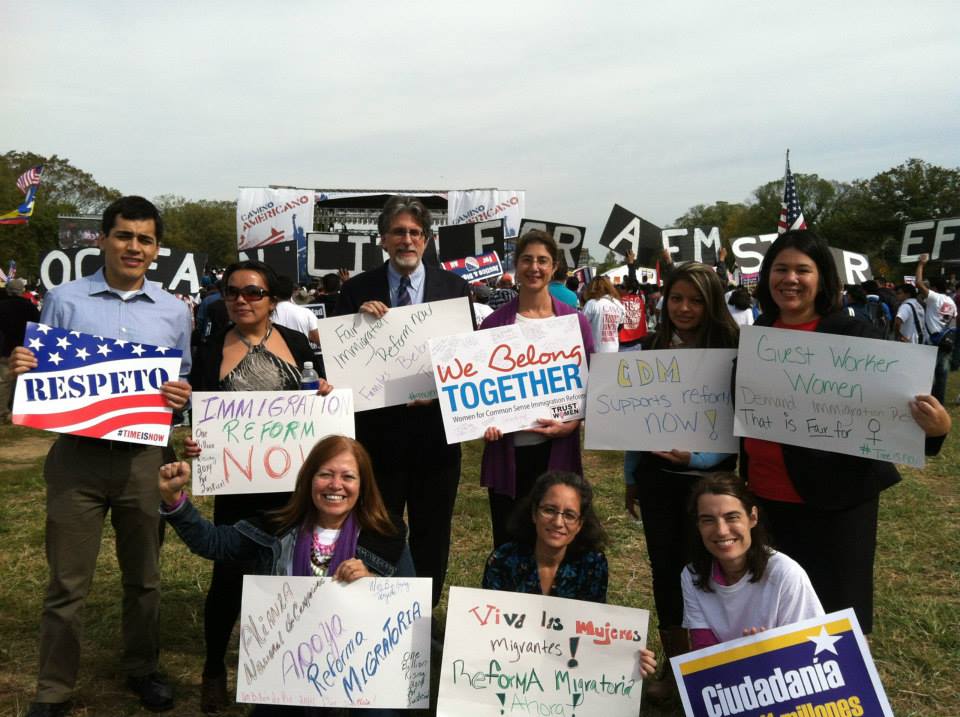Women fight for immigration reform in guest worker programs
Oxfam America invites three guest workers to tell their personal stories.
Mary Babic is the Communications Officer of Oxfam America’s United States Regional Office.
As the main provider for her family, Adareli Ponce has traveled from Mexico to work in the crab and chocolate industries on US temporary visas nine times over the past ten years. She paid fees to recruiters for the visa and the promise of employment. Three times she was defrauded, and found no job waiting for her.

Ponce’s experience is all too common. Each year, thousands of women are recruited in their home countries with promises of lucrative jobs, visas, and training programs in the US. They struggle to come up with the fees, only to find horrors on the other side of the border—abuse, exploitation, human trafficking, sexual harassment, and fraud.
Last week, Oxfam America’s program supporting low-wage food workers helped Centro de los Derechos del Migrante, Inc. (Center for Immigrant Rights, or CDM) fund a delegation of women guest workers to come to the US to speak out about their experiences of international recruitment abuse and trafficking with members of Congress, to the media, and with fellow immigrants and activists at the March for Immigrant Dignity and Respect.
Fernanda Defaz from Ecuador, a university graduate who paid $4500 to a recruiter for a “hospitality management training” program, was also part of the delegation in DC last week. With an opportunity coming under the J-1 visa program, Defaz made the journey to the US with high hopes. But instead of being trained in management, much to her surprise, Defaz ended up vacuuming, dusting, cleaning tables, and taking out the trash, and being paid just US$400 a month.
“I felt tricked,” Defaz said. “But I had spent so much money to participate that I couldn’t just turn around and leave. I was fortunate to recoup some of the money I lost. But I worry that my ‘sponsor’ continues to recruit young people with false promises.”
The delegation also included Mily Trevino-Sauceda with the Alianza Nacional de Campesinas and a woman from the Philippines, who was unable to release her name or personal details due to security concerns.
Oxfam America’s support of the delegation is part of an emerging program focused on helping women food workers in the US, who face some of the worst (and lowest-paid) working conditions in the country. Many come to the US as guest workers under the H2 visa program, which allows American employers to hire temporary workers from other countries. Every year, thousands come to the US to fill seasonal jobs, such as picking fruits and vegetables. While the program ostensibly protects workers’ wages and working conditions, these requirements are poorly enforced, and guest workers often suffer as a result.
“[Guest worker] women are commonly excluded and made invisible in debates about immigration,” said Adareli Ponce, a member of the Comité de Defensa de Migrante (Migrant Defense Committee), a group of Mexico-based migrant leaders. “Even if women are a minority, we also migrate to work.”
Women make up at least 40 percent of the immigrant workforce. Recruitment fees are illegal for H-2 guest workers, but poor enforcement means workers are regularly charged high fees. In a recent study of H-2 guest workers, CDM found that 58 percent of workers reported paying recruitment fees to come to the US to work, and 47 percent took out loans to cover these expenses. When workers owe money to recruiters back home, they find themselves caught in situations of forced labor, involuntary servitude and debt bondage and are reluctant to leave bad working conditions.
On Monday, the delegation met with Congressional staffers from both parties, offering personal experiences with and need for reform in guest worker programs.

On Tuesday, the women joined thousands of immigration reform protesters outside the Capitol (including several Members of Congress, eight of whom were arrested) at the March for Immigrant Dignity and Respect. People traveled from all over the country to push Congress to pass broad immigration legislation that includes a path to citizenship for immigrants in the country illegally. Speakers included civil rights legend Julian Bond, House Democratic Leader Nancy Pelosi, and the singer Lila Downs.
Ponce’s story was featured in a story on the DC march by Univision, and a podcast interview by radio journalist Alice Ollstein. There, she said:
“We want people to see that we’re human beings, to touch their hearts to see that we’re not here doing anything wrong – just working. Our countries don’t offer us these opportunities, so we look for them here.
“Nothing will change if we don’t try.”